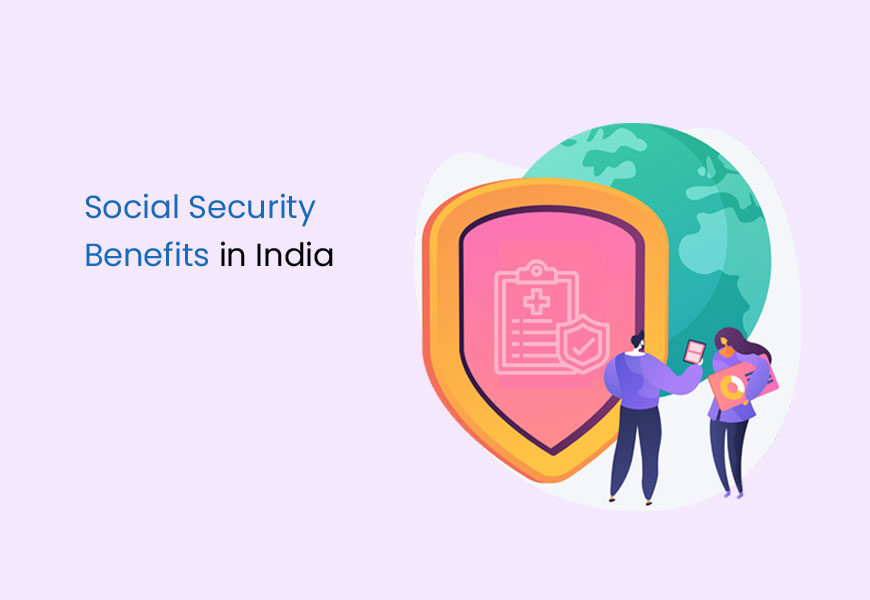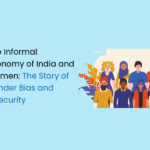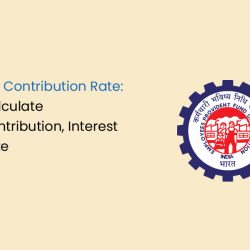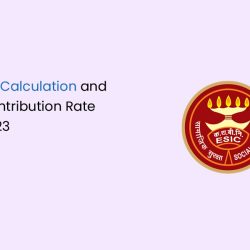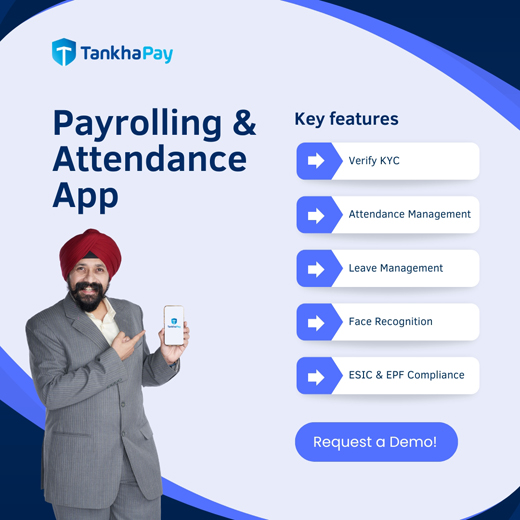The term social security is often associated with the US where it refers to the retirement benefits to pensioners and disability income to eligible persons offered by the federal government. But social security is neither a US-based system nor limited to retirement and disability benefits.
Social security as a term may be new to India but the concept isn’t. Though not universal by law, India’s salaried class in formal employment and now some sections of unorganized sectors have access to social security benefits. Want to know what exactly these social security benefits are? Find out in the article as we take a closer look at India’s social security benefits.
Social Security Benefits: A Quick Introduction
Social security is a system to help individuals and their families maintain their family income/ standard of living even in the face of an involuntary loss of income, major unforeseen expenses or the disruption of their income. Often established by legislation, social security is based on contributions from employers, the government and the employees themselves.
While its constituents vary across countries and industries, social security benefits typically include insurance, healthcare, retirement, disability and maternity benefits. These benefits are often provided to employees and by extension, their families.
The International Labour Organisation (ILO), United Nations (UN) and other conventions view social security as a basic human right. This is because it provides a sense of financial security to individuals and their families, helping them manage the risks of socio-economic eventualities.
The Social Security System in India
In India, social security is provided and/or mandated by the government through an array of programs and schemes across various laws and regulations. It is provided by the government as a form of social insurance to individuals and families, offering them financial security in the event of the death of a breadwinner, sickness, hospitalization, natural disasters, work injury and so on.
Social security in India is unlike other countries where social security is just mandatory payments into government-controlled funds (China) or statutory cash benefits (UK). It is a contributory system where employers and employees contribute through voluntary and mandatory payments. The exact contribution varies from scheme to scheme.
1. Pension
Pension, also known as superannuation in some regions, is a fund or scheme to which monetary contributions are pooled throughout the working years of an individual by the employer, employee and/or the government. The benefits of these contributions are available to the individual or their family after retirement or death of the individual. Pensions are a key source of retirement and survivorship income for many.
In India, pension is made available through the Employee Provident Fund (EPF) scheme. It was established through the Employee Provident Fund and Miscellaneous Provision Act, 1952. This scheme is regulated by the Ministry of Labour and Employment, Government of India and managed by Employee Provident Fund Organization (EPFO).
Under this scheme, contributions are compulsory for both the employer and the employee for employees with earnings up to Rs.15000 per month. When the employee earns more and is already a member of EPFO, the employer needs to only contribute for the first Rs.15000. If the employee earns more than Rs.15000 and is not a member of the EPFO, EPF contributions are voluntary. The employees’ contribution is deducted from their monthly salary and credited into their PF account.
The employer contribution is 12% of basic wages of the employee (plus dearness allowance and retaining allowance). The employees must contribute 12% of their basic wages too but may opt to contribute higher. EPF is mandatory for establishments with 20 or more employees and voluntary for those having fewer than 20 employees.
Pension in India, provided through EPF, doesn’t just include retirement benefits but survivorship income too. When an EPFO member dies, their dependents including the widow/ widower and children receive monthly pensions.
2. Healthcare Benefits
Healthcare benefits such as health insurance, sickness benefits, disablement allowances, etc. enable individuals and their families to access proper healthcare and ensure their overall well-being.
In India, the Employees’ State Insurance (ESI) Scheme established by the Employees’ State Insurance Act, 1948 enables access to integrated healthcare benefits to employees. The benefits enable employees to protect themselves and their families against the impact of sickness, disablement, maternity or death.
If an employee is enrolled under ESIC, they can enrol all their dependents in the scheme and avail free medical treatments without any upper limit on expenditure at any ESIC hospital/ dispensary. They gain access to free out-patient consultations including specialist consultation, hospitalization, medication, laboratory testing, imaging, immunization, etc. Overall, the ESI scheme reduces the out-of-pocket medical expenses of employees.
Employees earning Rs. 21000 or less (Rs. 25000 or less in case of persons with disability) are eligible for the ESI scheme. This scheme also requires contributions from the employer and employee. While employers contribute 3.25% of the wages paid/payable, employees contribute 0.75% of the wages paid/payable.
3. Disability Benefit
When employees get injured at work, the temporary or permanent disablement has serious consequences for themselves and their families. Firstly, the family faces a loss of income. Then, they have to bear the immediate and long-term medical expenses, rehabilitation expenses and so on.
The ESI Scheme also extends disability benefits to employees in case of temporary or permanent disablement. A member of ESI receives a disability allowance in addition to the cash-free medical expenses.
In addition, India has the Employees’ Compensation Act, 1923 that obligates employers to pay a stipulated compensation to employees if they are injured at work or contract an occupational disease.
4. Maternity Benefits
Maternity benefits enable women to get access to proper medical care in the pre- and post-natal stages. It gives them income security during their pregnancy and after, when they will be unable to participate in work.
An employee registered under ESI scheme can avail maternity benefits. Under the scheme, maternity benefits are extended for up to 26 weeks and stipulated time periods in case of miscarriage, confinement, medical termination of pregnancy or other complications.
Women in India are eligible to an array of maternity benefits as per the provisions of the Maternity Benefit (Amendment) Act, 2017. Insured women are entitled 26 weeks of paid maternity leave for the first 2 children. There are provisions for paid maternity leave for adoption of children, medical termination of pregnancy and miscarriages. The Act also prescribes the setting up of day care/ creche facilities and offering remote work arrangements, among others.
5. Insurance Benefits
Insurance helps individuals and their families to face uncertainties such as layoff, involuntary loss of income, sudden expenses or death of an earning member.
When an earning member expires, families find it difficult to make ends meet. To this end, survivorship benefits are critical. Both EPF and ESI schemes offer a number of survivor benefits in case a member expires.
- Life insurance benefit up to Rs. 7 lakhs under EPF
- Monthly pensions to dependents
- Funeral expenses, etc.
In case of layoff, involuntary loss of income or other major expenses (education, marriage, etc.), EPF members can withdraw partial amounts in advance.
6. Gratuity
Through the provisions of the Payment of Gratuity Act, 1972, employees who have worked 5+ years with an organization get 15 days’ wages per service year. Gratuity is a lump sum payment made by establishments with 10 or more employees. In case an employee expires or is disabled, the gratuity sum is paid to their legal heir or nominee.
Can These Benefits Be Extended Beyond the Formal Employees?
Yes. While most legislations mandate social security benefits only for those in formal employment (white and blue-collared), employers can choose to voluntarily provide these benefits to their employees. In India, 93% of the workforce is in informal employment as domestic workers, drivers, gig workers, platform workers and so on who find it tough to make ends meet.
If there is a natural disaster or a sudden hospitalization of a family member, they will be pushed deeper into poverty. Given this context, voluntary payment of social security by employers has significant value. It helps formalize work for informal workers and provides them with financial security in the face of socio-economic eventualities.
How Can You Start Paying Social Security to Your Informal Workers?
TankhaPay understands the criticality of social security for the vast informally employed population of India. That is why we have developed a platform that enables individual employers to pay social security effortlessly to their household, gig, informal and temporary workers. Find out more now.
Or
Download the TankhaPay app now
![]()
![]()

